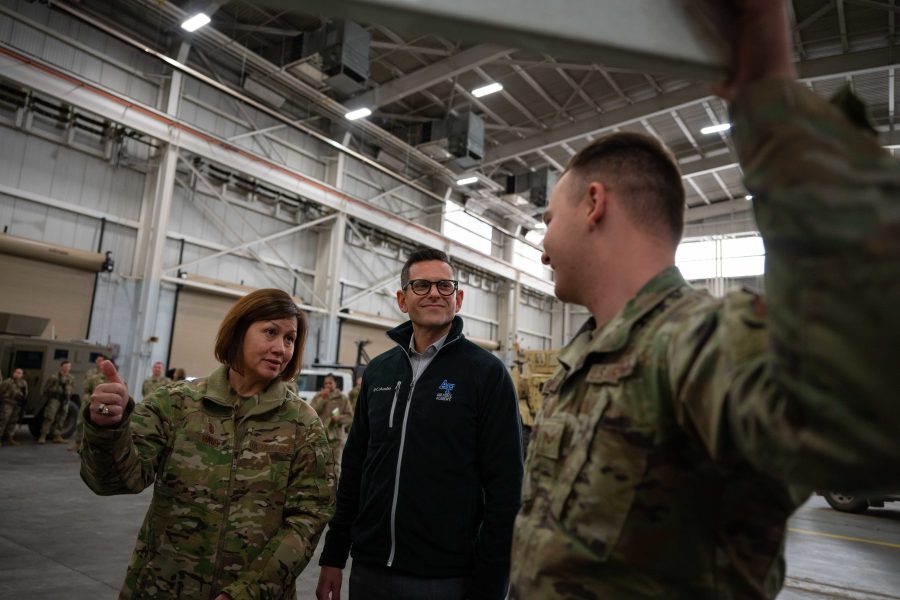From making it easier for pregnant women to continue flying to updating its pilot candidate scoring mechanism, the Department of the Air Force has made changes big and small in the last few years with an eye toward diversity and inclusion, part of a broader push by the Pentagon to make the U.S. military more diverse.
The DAF’s top civilian on those matters, assistant secretary of the Air Force for manpower and reserve affairs Alex Wagner, is a political appointee of President Joe Biden but has spent most of his career at the Pentagon like his boss, Secretary of the Air Force Frank Kendall.
“I look at this institution that in some cases is more diverse than the American population,” Wagner told Air & Space Forces Magazine in an interview. “We’ve got an increasingly diverse country; we’ve got the demographic trends creating even more diversity. We have to be, in order to succeed, a mirror of the country that we claim to and do defend.”
Such change takes time, and Wagner praised the work of his predecessors on the effort.
“A lot of good work started on these topics when I was last in the Pentagon during the Obama administration, and a steady drumbeat continued during the previous administration,” said Wagner, who served as Chief of Staff to the Secretary of the Army from 2015-2017. “The table was really very well set for when I came back to the building, not only building on a number of the efforts that began in the Obama administration, but were resourced—fully resourced—and allowed to grow and thrive during the Trump administration.”
But there have also been reminders of how far the service still has to go. Before Wagner came into his role, Air Force Inspector General reviews in 2020 and 2021 found racial and gender disparities throughout the force, leading top officials like Kendall to call for more reflection and work on the effort
“There are a lot of disparities within the Air Force,” Kendall acknowledged in September 2021.
Some two years later, the service has made much progress, service officials say. And Wagner presented a business case for why that progress was important. Before rejoining the Pentagon in June 2022 in his current role, Wagner helped lead up talent and workforce efforts at the Aerospace Industries Association.
“CEOs whose principal job is return of shareholder value have made very conscious decisions that diverse teams can get them more money,” Wagner said. “My focus is building and manning a force that scares the hell out of our adversaries, that deters our near-peer competitors. And how do I do that? Well, diversity is an important part of that. And it’s one of our actual advantages, and I want to leverage that advantage to the maximum extent possible.”
Increasingly, efforts to increase diversity and inclusion in the military have become hot-button cultural issues, with critics arguing the Pentagon is attempting to be “politically correct” at the expense of readiness. Perhaps the most high-profile current example is that of Sen. Tommy Tuberville, who has placed a legislative hold on all flag and general officer nominations in protest of the Pentagon’s policy to provide paid leave and travel funds for troops requiring reproductive services, including abortions, who are based in states where those services are not available.
But Wagner said there were misperceptions on both sides of the aisle that were unhelpful—a point Kendall has argued as well—about military service.
“If you look at surveys of the most trusted institutions in public life, the military is either at the top or a close second,” Wagner said.
In 2023, around two-thirds of Americans have “a great deal” or “quite a lot” of trust in the military, according to Gallup polling, while just one-tenth have “very little.” Trust in the military has decreased in recent years, though that trend matches a pattern across public institutions in general.
Americans’ support for the military means perceptions of politicization carry great risk, Wagner said.
“I think the military has always been something that’s been a juicy target for politicization,” he said. “I hope that it’s not a self-fulfilling prophecy, because right now, I do not think the military is political.”
Access to reproductive healthcare in the military and support for LGBTQ+ service members and their families have become national issues—whether the Pentagon likes it or not—especially over the last year. But Wagner argues quality of life concerns are readiness issues.
“Every day I come to work, we are not talking or thinking about things that people say are political,” Wagner said. “I am laser-focused, the Chief of Staff of the Air Force, the Chief of Space Operations, the Secretary of the Air Force, is laser-focused on taking care of our people. I don’t consider health care political. I don’t consider child care political. I don’t consider spouse employment political. I don’t consider housing political. I want people to feel safe. I want people to feel included and people focused on their mission because the challenges out there are rising. And we’ve got to be ready to meet them.”
